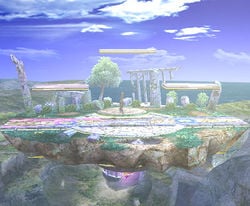Stage: Difference between revisions
MarioGalaxy (talk | contribs) mNo edit summary |
m (→Melee Stages) |
||
| Line 131: | Line 131: | ||
* [[Yoshi's Island (SSBB)|Yoshi's Island]] | * [[Yoshi's Island (SSBB)|Yoshi's Island]] | ||
===[[Melee]] | ===[[Past and Melee Stages|''Melee'' Stages]]=== | ||
* '''[[F-Zero Grand Prix: Big Blue|Big Blue]]''' | * '''[[F-Zero Grand Prix: Big Blue|Big Blue]]''' | ||
* [[Planet Zebes: Brinstar|Brinstar]] | * [[Planet Zebes: Brinstar|Brinstar]] | ||
Revision as of 14:11, December 10, 2008
A stage is a location where characters fight. A stage can also be called a "map" or "board." The stages are usually locations that are from a character's universe, however there are some stages like Final Destination that come from the Super Smash Bros. universe. There are many different types of stages that appear in the Super Smash Bros. series. The typical stage generally comprises a floored center with ledges on each side, separating the floor from the abyss, and platforms above to which characters can jump upon and drop through. Some stages, however, such as Fourside, can be much more complex, complete with moving platforms, walls, and ceilings. Furthermore, there are some stages, like Icicle Mountain, that move continuously.
A stage can also contain obstacles and enemies, which contribute to the charm of Smash Bros. These stages are designed to give characters challenges and take precautions while they fight. For example, the Kingdom II stage features Birdo and her eggs, which she fires at the fighters.
There are stages that have simple designs and do not contain any obstacles or enemies. These stages include Final Destination and Battlefield. These stages focus more on competitive play.
Moving stages were introduced in Melee. These stages, such as Rainbow Cruise, operate in a scroll-like mode, where the scene continuously moves, or scrolls, which makes for some entertaining gameplay mechanics. These stages are not used in high-level play because they introduce too much luck into the gameplay.
There are also special stages that were not designed for battling, like the stages in the Adventure Mode of Melee. These stages were designed for a character to travel across the stage and reach a certain checkpoint.
Bonus stages are another type of stage. These bonus stages include Target Test and Board the Platforms. These stages were designed to test the player's ability to complete a task of the bonus stage by using the character's different abilities to achieve their goal. Bonus stages cannot be selected for versus mode play.
Stages are also a factor that is included in tournament legality. Some of the stages in Melee are banned in tournaments because of numerous reasons. Some stages like Temple and Yoshi's Island N64 were banned because they gave an unfair advantage to some characters during battle. Other stages, like Icicle Mountain, were banned during tournament play because their movement disrupts the battle, and gives players chances they normally would not encounter (meaning advantages and disadvantages).
Super Smash Bros.
Following is a list of all the stages found in the original Super Smash Bros. series. There are nine stages in Super Smash Bros., eight of which are available from the start, and one of which is unlockable. Stage in bold is an unlockable stage.
Stages
- Congo Jungle
- Dream Land
- Hyrule Castle
- Mushroom Kingdom
- Peach's Castle
- Planet Zebes
- Sector Z
- Saffron City
- Yoshi's Island
Single-player stages
- Board the Platforms stages
- Fighting Polygon Stage
- Master Hand's Stage
- Metal Mario's Stage
- Target Test stages
Non-playable stages
Super Smash Bros. Melee
29 playable stages in total are available for play in Super Smash Bros. Melee. 18 stages are available from the start, while an additional 11 can be unlocked. Three of the unlockable stages are from the original game. Stages in bold are unlockable stages.
Melee stages
- Special Stages: Battlefield
- F-Zero Grand Prix: Big Blue
- Planet Zebes: Brinstar
- Planet Zebes: Brinstar Depths
- Lylat System: Corneria
- Special Stages: Final Destination
- Superflat World: Flat Zone
- Dream Land: Fountain of Dreams
- Eagleland: Fourside
- Termina: Great Bay
- Dream Land: Green Greens
- Infinite Glacier: Icicle Mountain
- DK Island: Jungle Japes
- Mushroom: Kingdom
- Mushroom: Kingdom II
- DK Island: Kongo Jungle
- F-Zero Grand Prix: Mute City
- Eagleland: Onett
- Kanto Skies: Poké Floats
- Kanto: Pokémon Stadium
- Mushroom Kingdom: Princess Peach's Castle
- Mushroom Kingdom: Rainbow Cruise
- Hyrule: Temple
- Lylat System: Venom
- Yoshi's Island: Yoshi's Island
- Yoshi's Island: Yoshi's Story
Past stages
Single-player stages
- Adventure stages
- All-Star Teleporter
- Entei
- Goomba
- Home-run Stadium
- Majora's Mask
- Race to the Finish
- Snag the Trophies stage
- Target Test stages
Non-playable stages
Super Smash Bros. Brawl
A total of 41 playable stages appear in Super Smash Bros. Brawl, 10 of which return from Super Smash Bros. Melee. 29 of these stages are available from the start, while 12 more must be unlocked. Players can also create their own stages, to an extent, with the Stage Builder feature. Stages in bold are unlockable stages. None of the original Super Smash Bros. stages return.
Brawl Stages
- 75m
- Battlefield
- Bridge of Eldin
- Castle Siege
- Delfino Plaza
- Distant Planet
- Final Destination
- Flat Zone 2
- Frigate Orpheon
- Green Hill Zone
- Halberd
- Hanenbow
- Luigi's Mansion
- Lylat Cruise
- Mario Bros.
- Mario Circuit
- Mushroomy Kingdom
- New Pork City
- Norfair
- PictoChat
- Pirate Ship
- Pokémon Stadium 2
- Port Town Aero Dive
- Rumble Falls
- Shadow Moses Island
- Skyworld
- Smashville
- Spear Pillar
- Summit
- WarioWare, Inc.
- Yoshi's Island
Melee Stages
- Big Blue
- Brinstar
- Corneria
- Green Greens
- Jungle Japes
- Onett
- Pokémon Stadium
- Rainbow Cruise
- Temple
- Yoshi's Island
